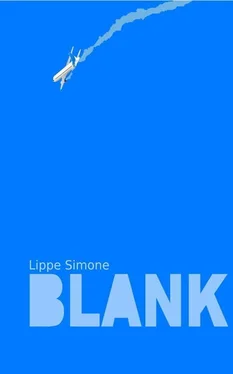Lippe Simone - Blank
Здесь есть возможность читать онлайн «Lippe Simone - Blank» весь текст электронной книги совершенно бесплатно (целиком полную версию без сокращений). В некоторых случаях можно слушать аудио, скачать через торрент в формате fb2 и присутствует краткое содержание. Год выпуска: 2014, Издательство: Indefensible Publishing, Жанр: Фантастика и фэнтези, на английском языке. Описание произведения, (предисловие) а так же отзывы посетителей доступны на портале библиотеки ЛибКат.
- Название:Blank
- Автор:
- Издательство:Indefensible Publishing
- Жанр:
- Год:2014
- ISBN:нет данных
- Рейтинг книги:5 / 5. Голосов: 1
-
Избранное:Добавить в избранное
- Отзывы:
-
Ваша оценка:
- 100
- 1
- 2
- 3
- 4
- 5
Blank: краткое содержание, описание и аннотация
Предлагаем к чтению аннотацию, описание, краткое содержание или предисловие (зависит от того, что написал сам автор книги «Blank»). Если вы не нашли необходимую информацию о книге — напишите в комментариях, мы постараемся отыскать её.
Blank — читать онлайн бесплатно полную книгу (весь текст) целиком
Ниже представлен текст книги, разбитый по страницам. Система сохранения места последней прочитанной страницы, позволяет с удобством читать онлайн бесплатно книгу «Blank», без необходимости каждый раз заново искать на чём Вы остановились. Поставьте закладку, и сможете в любой момент перейти на страницу, на которой закончили чтение.
Интервал:
Закладка:
One after another Clint quickly opened and looked behind each door and found himself taking a rough accounting of the crew. With at least one in each stateroom and the two in the galley — one with his throat artlessly cut and the other shot through the sternum with a spear gun — there was a crew of eight. Of those, the total that had been killed in what appeared to be a fast-paced and impeccably evenly sided battled, was eight.
The remainder of the main deck was one large stateroom eerily free of blood and bodies and another door with a dark portal window which opened to the stairs down to the even darker lower decks. Clint balanced the evidence so far with the probability that he’d find a friendly and helpful stowaway hiding in the darkness and barred the door with a mop handle. The kitchen had almost no food and in particular the jam supplies were completely exhausted. And to Clint’s immense surprise there remained a great deal to drink. Whatever purpose had brought this boat so mysteriously far out to sea there was strong evidence that it was to allow everyone on board to drink themselves to death.
Most of them had narrowly averted that fate, but were nevertheless now of very little use to Clint. The boat was becalmed, in fact the ocean was particularly gelatinous under the cloudless skies and ruthless sun, and it normally needed a crew of, apparently, eight to go anywhere. Lord and Lady Marmalade Jam had clearly suffered some sort of preserve-related trauma which put them beyond usefulness and in any case looked like the sort who didn’t usually drive their own vehicles.
Clint climbed the stairs to the bridge. It was a mostly enclosed high-technology show-room surrounded by vast windows on three sides and open at the back. He inspected the banks of computer screens and GPS units and keyboards and radar displays with the engaged understanding of a Christmas shopper who’s accidentally walked into a New York Gallery to get out of the rain. None of the machinery meant anything to him and in any case none of it was on, which he received as something of a relief.
But he recognized the moment he saw it the classic shape of a ship’s wheel, the only wooden thing on the deck, with spokes and handles and brass fittings and a salty character that made it look a little intimidated by its state-of-the-art surroundings, like a retired bomber pilot invited to sit in on a moon launch. Next to the wheel was a chrome lever that almost had to be a throttle and next to that was a key in a housing that looked just like a car’s ignition and which Clint concluded was very probably a boat’s ignition. Concentrating on only those three elements and barring disasters it was just possible, Clint thought, that he could make this floating penthouse apartment go where he wanted it to go.
Which might have been true, but he didn’t know where he wanted it to go. He hadn’t the most distant idea which was the direction home except there was only one of those and an almost limitless number of directions toward desolate and empty sea and an eventual death by alcohol poisoning. Clint felt sure that he could point the boat in the rough direction of shore if he had a compass and watch and at least some idea how it is that people navigate with a compass and a watch.
Clint allowed his hands to sweep over the arc of the wheel and smooth ergonomics of the throttle hoping in some way to commune with the machinery in the way he imagined that great navigators of the early days of discovery transcended GPS technology. Stationed thusly, he took in the horizon and it all looked for as far as the eye could see and in a perfect circle exactly the same. The was no wind nor wave to decide direction for him. No other vessels to hail. No sound nor cloud nor friendly dolphin to guide him home.
And then there was something else. Something so indistinctly anything that it had an air of having been there all along but now there was just a bit more of it. It may have been as simple and subtle as a change in the air pressure but whether up or down Clint couldn’t say. It may have been a sound but if it was it shared a frequency with the shy hush of the ocean. And in a moment it was a thing. It was real and solid and big and it was a passenger jet and it was dropping right out of the sky and onto Clint.
He couldn’t, but Clint imagined that he could see the pilots’ calm and cheerless faces, reconciled to their fate, as they hurtled toward the yacht. It would all be over within seconds and Clint found himself wondering if the plane had been coming from land or going toward it when, by all appearances, it ran out of gas. He had little expectation of surviving what was about to happen but meant to profit from the development if he did.
The jet passed over head and the immensity and forced perspective and general oddness of such an occurrence created the illusion that if he’d climbed on top of the bridge and jumped he could have touched the bottom. Certainly the jet was for a moment the entire sky and then it was passed and still whole. And then it hit the water.
The jet had managed to travel possibly another one or two miles in the few seconds between passing over the yacht and becoming one with the ocean in very much the same way that a snowball maintains its identity until colliding with a field of snow. The impact was spectacular and was for a moment the only physical presence of the merging of water and airplane. The ocean was the very concept of impact made physical and the jet was gone altogether. Water rose into the air in the shape and size of a Roman colosseum and then inverted and pursued the plane to the bottom, frozen for a moment in the form of an impossible hole in the sea.
And then came the rebound as the hole filled itself, generating shockwaves that raced away from the point of impact as though the nursemaids of the gods had taken hold of the vast bed sheet on which rested the tiny yacht and given it a sharp snap. A wave like an enraged runt mountain gamboled toward the boat, consuming the horizon and rapidly picking up speed and mass and murderous intent.
Clint chapter 2
Seen from above, the shock wave generated by the impact of a jet plane into the sea is doubtless a thing of scientific and natural beauty, composed of fluent and mathematically precise concentric rings describing a frequency corresponding to the velocity, mass and density of the actors in a uniformly choreographed exhibition of fluid dynamics. Seen from the surface of the water from a distance of a mile it’s an onrushing wall of death.
The wave gathered the yacht to its bosom and ran with it like a wide receiver clutching up a fumble in the dying seconds of a losing game against bitter rivals. If Clint hadn’t been sick before, and he had, then he was now. The sudden gain in altitude was complemented by an impossible angle with the stern facing almost directly down and the bow almost directly up and Clint holding onto the ship’s wheel to keep from falling out the back of the bridge and into open water. Soon enough though the yacht turned so that it was travelling rapidly through the air sideways near the top of the mountainous wave. Clint could see nothing but sky and the ride was an uncannily comprehensive reproduction of the sensation of falling from a great height.
In fact the boat wasn’t falling at all but holding high on the wave like a piece of driftwood. A piece of driftwood that’s about to be dashed to pieces by the fury of the ocean. When the crash and crush and curtains didn’t come, even after what seemed like an hour but was probably less than 15 seconds, Clint realized that the tiny speck of a yacht was in fact surfing in its own clumsy oversized multi-decked oblong way across the water.
The yacht fell horizontally for several minutes, dandled on the lap of the giant wave as it hollered its deafening din of tons of water folding into yet more tons of water. In time the hoarse shouting dimmed and the violent shaking diminished and Clint, clutching the ship’s wheel and clenching his eyes and teeth, began to allow himself the luxury of hope. And in tiny measures hope was made gradually manifest as the wave carried the yacht far from the site of the crash and then slowly and gently died, depositing its charge safely in calm waters, like a leaf that’s found its way against all odds out of a raging river and into a shallow tributary creek. And Clint, still fused to the ship’s wheel and soaked from head to toe by, mostly, sea-water, opened his eyes and saw land.
Читать дальшеИнтервал:
Закладка:
Похожие книги на «Blank»
Представляем Вашему вниманию похожие книги на «Blank» списком для выбора. Мы отобрали схожую по названию и смыслу литературу в надежде предоставить читателям больше вариантов отыскать новые, интересные, ещё непрочитанные произведения.
Обсуждение, отзывы о книге «Blank» и просто собственные мнения читателей. Оставьте ваши комментарии, напишите, что Вы думаете о произведении, его смысле или главных героях. Укажите что конкретно понравилось, а что нет, и почему Вы так считаете.












